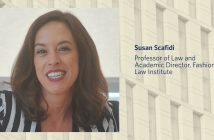U.S. Circuit Court Judge Denny Chin ’78, Lawrence W. Pierce Distinguished Jurist in Residence, and Thomas Lee, Leitner Family Professor of International Law, spoke with National Law Journal about the importance of the creation of the Center on Asian Americans and the Law at Fordham Law. Co-directed by Judge Chin and Professor Lee, the Center launches on November 9.
Fordham University School of Law will officially launch the Center on Asian Americans and the Law next week, and for the center’s co-directors, Judge Denny Chin and Thomas Lee, it holds deep personal meaning.
…
Fordham’s Center on Asian Americans and the Law, believed to be a first-of-its-kind institution, will function as a hub and platform for interdisciplinary scholarship on issues of interest not just to the Asian American and Pacific Islander (AAPI) community but to all Americans and people everywhere, according to the center’s flyer.
On Nov. 9, Fordham Law will host “The Lost History of Asian Americans and U.S. Civil Rights Litigation Lessons for Today” as it launches the center.
…
Chin, who served as a U.S. District Judge of the U.S. District Court for the Southern District of New York, the first Asian American appointed to such a position outside of the Ninth Circuit, for 16 years before joining the federal appeals bench in 2010, said that after his grandfather became a citizen in 1947, he was then able to bring his family to the United States when Chin was 2 years old in 1956.
“One of my great joys as district judge was swearing in new citizens,” said Chin, who has been teaching at Fordham Law for many years. “All of this history has great meaning for me. I enjoyed learning it and then teaching it.”
The center’s opening is also personal for Lee, the Leitner Family Professor of International Law at Fordham, because he was born in South Korea and came to the U.S. at the age of 5.
He said neither of his parents were educated in the U.S., but he attended Harvard College and served for four years as an cryptology officer in the U.S. Navy and four more years in the reserves.
Lee began teaching at Fordham Law in 2002, where he met Chin, and the two formed a friendship and mutual interest in Asian American studies.
…
They launched the center to help ensure that Asian Americans are part of the conversation as “the nation reckons with race and to participate in that conversation in a non-ideological, factual and thoughtful way,” according to the school’s announcement.
The center’s three core missions include: civic education by educating students, lawyers and the public on legal issues of importance to AAPIs and others; scholarship and AAPI legal studies by establishing a national hub for research and scholarship on AAPI legal issues; and outreach and public advocacy by generating interest in AAPI legal issues by reaching out to law firms, corporations, government, nonprofit institutions and the public, according to the center’s flyer.
The center emerged from a course on Asian Americans and the law that Chin and Lee first taught at Fordham Law in 2017, and then the center got underway this summer and has sparked an increase in courses focused on Asian Americans and the law at law schools throughout the country, according to Fordham Law’s announcement.
The course is now being taught at Cornell, the University of Virginia and Columbia law schools, either for the first time ever or the first time in a long time, and Bill Lee, the renowned trial lawyer who is representing Harvard in an affirmative action case, will teach the course at Harvard Law next fall, using materials Chin and Lee developed, according to Chin.
“We have a syllabus and are preparing a digital case book that is available for others to use,” he said.
“We wanted materials to speak for themselves” instead of including any slant or commentary, Lee said, explaining why they developed their own curriculum.
“We don’t want this perceived as a critical race theory class, but more of civic education for an important aspect of constitutional history” that hasn’t been given the attention it deserves, Lee said. “We don’t want to be characterized as a movement with a specific normative focus.”
Reenactments of historic cases, lectures and speaker panels, creation of a variety of digital materials, teaching workshops and film screenings are some of the programs and projects the center will offer, according to the center’s flyer.




